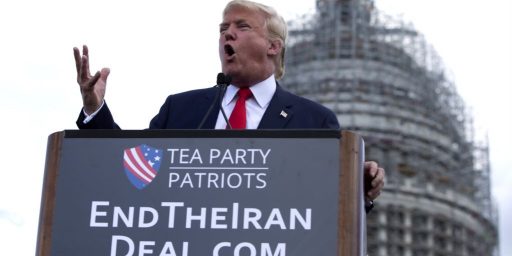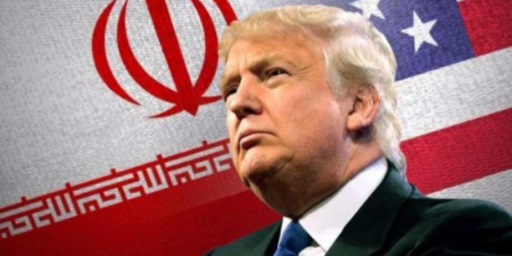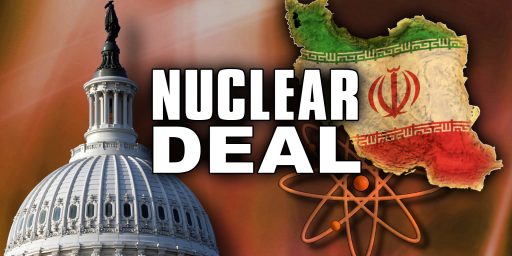UK Has Limited Options in Iran Hostage Standoff
Thomas Harding, the London Daily Telegraph‘s Defence Correspondent, argues that the British government has few viable options in its attempt to force Iran to return the 15 marines it is holding hostage. “Military action is unfeasible without American support and so is a military blockade of the Gulf. Unless the United Nations shows more rigour, sanctions are unlikely to hurt Iran in the short term” and therefore it is feared that “the 15 could be in for a long stay in Iran and face the nightmare prospect for Britain of a show trial.”
The phrase, “Unless the United Nations shows more rigour” is presumably rhetorical, unless Harding is referring to rigor mortis. Thus, the ball is the Tony Blair’s court and, if he so choses, George W. Bush’s.
Walid Phares believes that Iran took this gambit hoping to “trigger a regional crisis” and “precipitate a British action ending in a projected political disaster.” He recommends that,
In response, a multidimensional campaign should be launched, systematically yet gradually, instead of a single retaliation. Along with vigorous diplomatic pressures, the Coalition should formally condemn the regime and call for its isolation. It must create an unbalance of power with Iran via regional deployment while extending an emergency program of support to democracy forces within Iran, including a serious opposition broadcast.
Various other expert contributors to the NRO symposium on the crisis advocate even stronger measures. Still, I think Nick Gvosdev is right that ultimately this “is going to be about deciding what the least bad option is.”
What much of discussion on Iran is avoiding is the reality that there is no cost-free solution. No magic airstrike, no deus ex machine covert operation, no “grand bargain,” no display of Security Council unanimity over anemic sanctions, is going to result in an Iran that gives up its nuclear program, ends support for terrorism, stops its pursuit of regional hegemony and creates conditions for the disappearance of the Islamic Republic — and none of the options now on the table can guarantee that there won’t be profound negative consequences for U.S. interests.
The United States government should work with the Brits to calculate the least bad option. If a naval blockade is part of it–and I’m skeptical that it is–we should support it. Coming to a solution to the Iran mess is at least as much in American interests as Britain’s, notwithstanding the fate of 15 hostages.
While I agree with Ray Takeyh that our ultimate Iran policy is going to have to accept that they are a major regional power and agree to détente, that must come at the price of the regime playing by the basic rules of the international community.






My guess is the United Nations will respond aggressively only when it looks like the US and Britain (maybe Australia) begin to show indications of getting ready to “solve” this problem on their own.
The UN lacks the ability to respond aggresively, at least as I understand the meaning of the word. As others have noted, the only country capable of responding is the US. Out of deference to the UK since it is only their soldiers (thus far) held captive, the US appears to be keeping a pretty low profile.
I wonder how Mr. Brown wants to handle his first international incident?
James, you might want to take a look at my recent post here, The Briar Patch. Iran is benefiting directly from the uncertainty caused by this recent crisis they’ve fomented. It seems to me that this certainly isn’t lost on the Chinese, the regime’s increasingly important patrons and benefactors. It wouldn’t hurt for us to remind the Chinese that, when their most signficant source for oil imports is able to increase prices at will and the Chinese are highly dependent on increasing energy consumption to continue their growth, the Chinese become dependent on the whims of the regime. We should make it obvious to China that regime change in Iran is even more important to them than it is to us. With China on board in the UNSC all things are possible since the Russians probably won’t want to stick their necks out as the odd man out by vetoing resolutions against a regime that’s more of a threat to them than it is to anybody else.
If this current “hostage crisis” goes on much longer I think the Brits should seek a ban on gasoline sales to Iran as long as their service personnel are being held.
I think it’s important to emphasise the EU angle. The EU collectively enjoys extremely strong economic leverage over Iran (stronger than the USA). If they instituted a trade freeze and moved to call in Iranian debts it would very rapidly put the screws on the Iranians, as well as sending a strong message for the future. Furthermore, it seems to represent a more or less adequate middle ground between looking helpless and weak and going to war from a position of weakness.
Unfortunately – though predictably – the EU won’t play ball. The reports over here in the UK suggest that the FCO and the government have been doing some pretty hardcore lobbying at the ongoing summit in Germany but that the continentals aren’t up for it. As things stand we’ve had expressions of support but not support of a type that actually involves doing anything.
Nothing very new there, mind.
I keep hearing about the “huge amount” of trade that the EU does with Iran, but nobody ever reports any hard numbers. I have a hard time believing that trade with Iran is make or break for the economies of Germany and France. But maybe I’m just uninformed…
Detente doesn’t work when one side has no desire to ease tensions because it has no fear of worsening relations.
re captured brits, recall (1) margaret thatcher and (2) falkland is. historically, the strategy of whining, whether via EU or UN, is not an effective response to an attack.